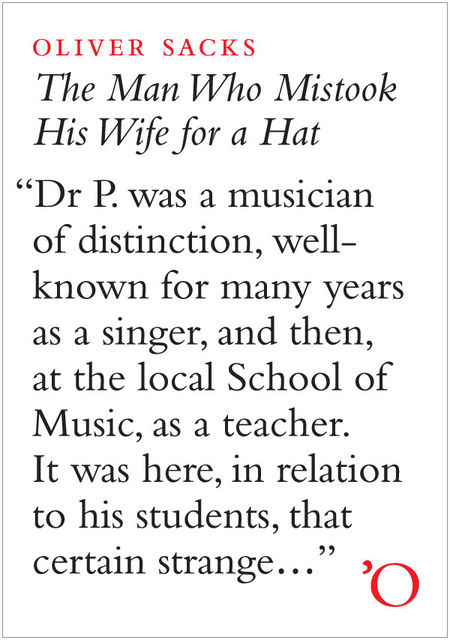The Man Who Mistook His Wife For A Hat and Other Clinical Tales
Ця книжка зараз недоступна
311 паперових сторінок
- Дата публікації оригіналу
- 2010
Враження
- Мариділиться враженням6 років тому👍Раджу🔮Мудра💡Пізнавальна🎯Корисна💞Романтична
Great book! Absolutely loved it.
- Morten Storm Hansenділиться враженням4 роки тому🙈Нічого не зрозумів
Цитати
- boydцитує8 років томуThe sort of facetious indifference and ‘equalisation’ shown by this patient is not uncommon—German neurologists call it Witzel-sucht
- bцитує3 роки томуPerhaps I could find advice or help in the medical literature— a literature which, for some reason, was largely Russian, from Korsakov’s original thesis (Moscow, 1887) about such cases of memory loss, which are still called ‘Korsakov’s syndrome’, to Luria’s Neuropsychology of Memory (which appeared in translation only a year after I first saw Jimmie). Korsakov wrote in 1887:
Memory of recent events is disturbed almost exclusively; recent impressions apparently disappear soonest, whereas impressions of long ago are recalled properly, so that the patient’s ingenuity, his sharpness of wit, and his resourcefulness remain largely unaffected.
To Korsakov’s brilliant but spare observations, almost a century of further research has been added—the richest and deepest, by far, being Luria’s. And in Luria’s account science became poetry, and the pathos of radical lostness was evoked. ‘Gross disturbances of the organization of impressions of events and their sequence in time can always be observed in such patients,’ he wrote. ‘In consequence, they lose their integral experience of time and begin to live in a world of isolated impressions.’ Further, as Luria noted, the eradication of impressions (and their disorder) might spread backward in time—‘in the most serious cases—even to relatively distant events.’ - bцитує3 роки томуscience became poetry, and the pathos of radical lostness was evoked.
fb2epub
Перетягніть файли сюди,
не більш ніж 5 за один раз


